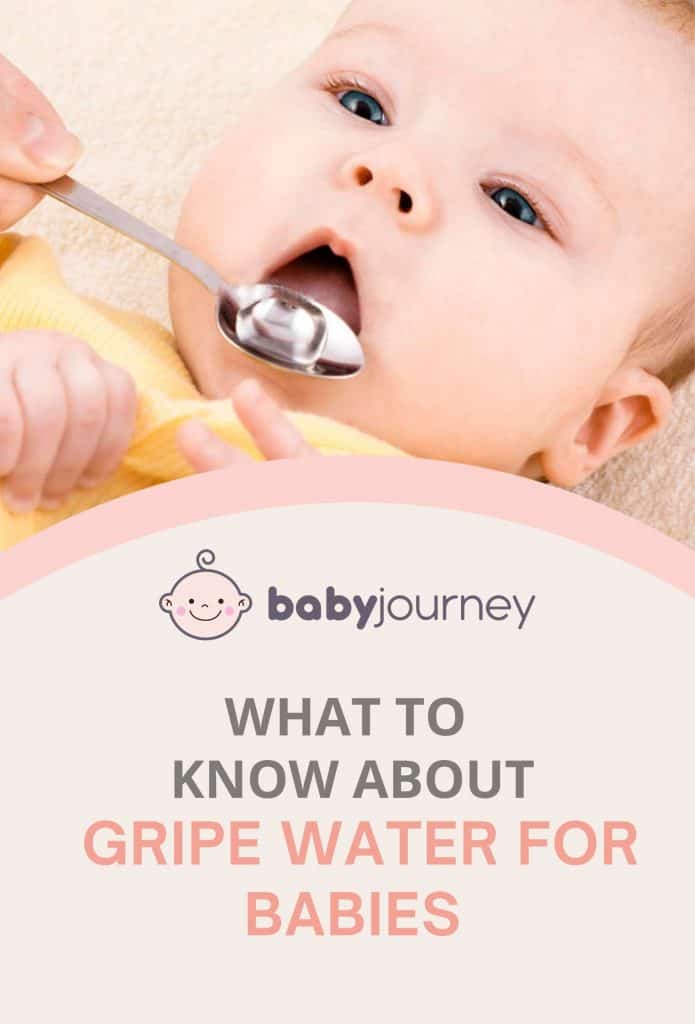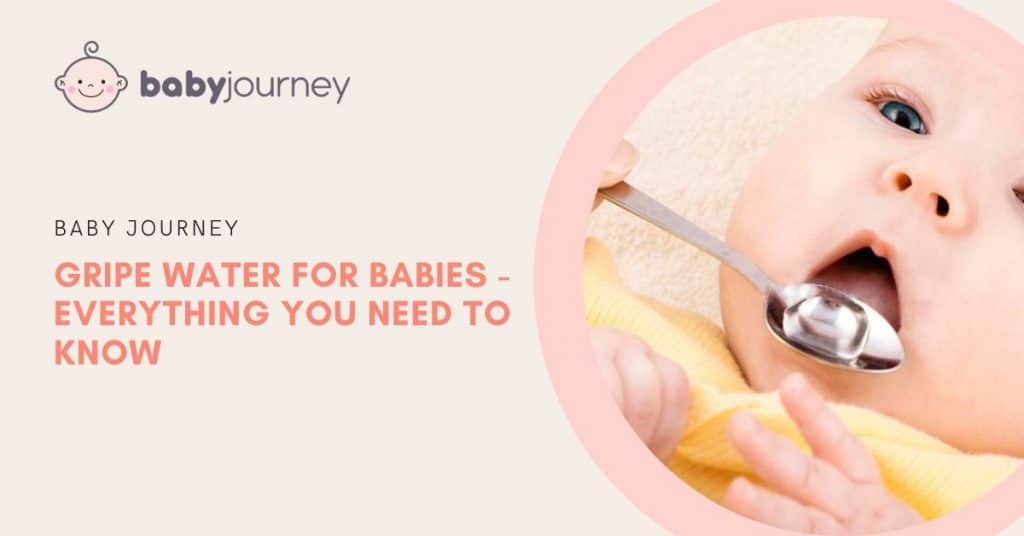Tummy issues are the most common problems newborns and babies face, which can cause them discomfort. Many parents swear by gripe water for babies to help them naturally relieve gas and colic.
Because my daughter was fussy at some point, I tried a lot of things to calm her and help overcome her upset tummy. Walking her around, going on a long ride, adjusting the diet, and gripe water helped most times. Also, it solved the hiccups pretty great.
If you wonder whether to give the baby gripe water, keep reading to find out more information about it. Hopefully, it will help you decide!
What is Gripe Water?
Gripe water is water with added ingredients that are believed to have a beneficial impact on baby digestion, teething problems, and hiccups. It contains different herbs, such as chamomile, lemon, fennel, dill, ginger, peppermint, and sodium bicarbonate.
As a herbal remedy, gripe water is a non-prescription product, which means you can find it in most grocery stores. It is available in drop form, and it has evolved since it first appeared on the market.
In the past, gripe water contained sugar and alcohol, but luckily, modern versions of gripe water nowadays contain purified water, agave, ginger or mint flavor, or dill oil.
Gripe water for newborns is the most worldwide-spread method of relieving tummy issues. A study based in India showed that over 60 percent of newborns were given gripe water. [1] The situation is similar in our surroundings, and most doctors and mothers recommend gripe water to help with colic, hiccups, upset tummies, and other types of discomfort.
Let’s take a closer look at other aspects of gripe water for infants and younger babies.
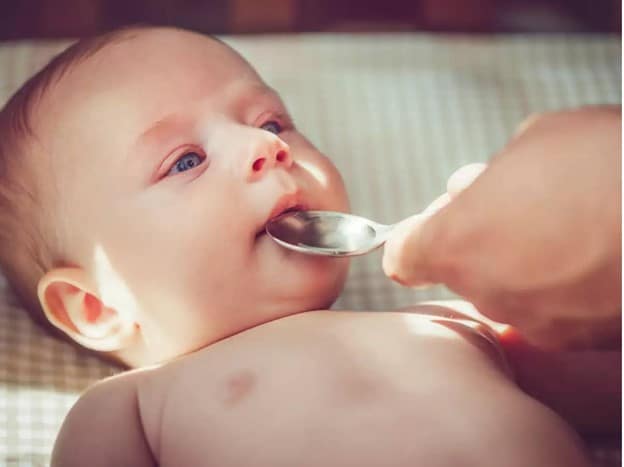
How Does Gripe Water Work?
So far, there aren’t official studies that prove the effectiveness of the gripe water for colic, gases, constipation, and other digestive issues. However, the anecdotal evidence and years of popularity show that it helps babies go through the first couple of months of their life with a less upset stomach.
The key to why most people believe in its effectiveness is in the gripe water ingredients. The combination of herbs in gripe water is selected based on their digestive and calming properties.
For example, sodium bicarbonate breaks the air bubbles and helps the baby to pass gas. But, be careful with gripe water containing this ingredient. According to Healthline.com, sodium bicarbonate shouldn’t be given to babies if not prescribed by doctors. [2] But you can always find sodium bicarbonate-free gripe water if your pediatrician doesn’t recommend it.
Another common ingredient in gripe water – dill oil is believed to relieve flatulence and prevents stomach weakness.
When to Give Baby Gripe Water?
If the pediatrician endorses gripe water, you can try giving it to the baby in small amounts half an hour after a meal.
That way, the food will start to digest, and the gripe water can be most beneficial. The baby can get gassy after eating too fast. Also, babies, same as adults, can gulp the air while eating, which can further cause gases and bloating.
Start by giving the baby gripe water one time per day, and see how the baby reacts.
The maximum recommended dose for babies older than one month is four times per day after a meal.
If the baby isn’t cranky, colicky, or gassy, you don’t have to be consistent with the gripe water. The effects are temporary, and won’t prevent further issues.
How often can you give gripe water depends on the baby’s symptoms and problems, but remember to stick by the rules: Never give it after every meal, and you should restrict it to a maximum of four doses in 24 hours.
Giving gripe water more frequently can get the baby full from it. The baby won’t be hungry, hence, it can refuse milk or formula, which can lead to inadequate weight gain or potential growth issues.
When to Use Gripe Water?
Some gripe water manufactures recommend their products for babies only two weeks old. But, doctors advise that you shouldn’t give gripe water to babies younger than one month.
If the baby has some digestion issues or has colic before it turns one month, you can try some other ways to soothe it. The digestive system of newborn babies is still developing in the first month and can be too sensitive.
Most doctors agree that the safe gripe water age is from two to six months, with the previous consultation with the pediatrician. It is true for gripe waters without additives, sugar, or alcohol.
It is because digestion problems usually stop at the age of four to six months.
According to the World Health Organization, newborns should be fed exclusively with breastfeeding milk until the age of six months. [3] But, infant feeding is a complex topic, so you should always discuss your doubts with doctors or patronage nurses.
Is Gripe Water Night Time Safe?
Some parents, myself included, find that giving gripe water in the nighttime is also useful because it helps the baby sleep with a relieved tummy.
However, it only works for gripe water without wheat, dairy, sucrose, gluten. These ingredients can induce an allergic reaction to gripe water or disrupt a baby’s sleep. I recommend sticking with all-herbal gripe water options that are nighttime safe.
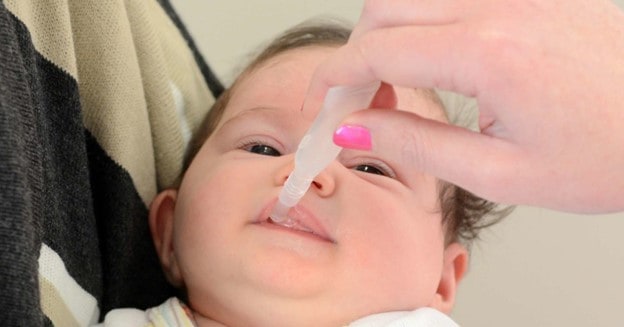
Gripe Water Safety and Side Effects
When it comes to food and baby, knowing the effects of consuming a particular item is important. The FDA doesn’t regulate gripe water production because it is considered a supplement, and not medicine. So, it may raise justified questions about gripe water side effects and overall safety.
Therefore, let’s take a closer look at some safety concerns related to gripe water for babies of different ages.
Newborns
Gripe water can worsen reflux symptoms in newborns, such as bringing milk up after feed, coughing, hiccuping, gulping after feeding, and others. [4] Therefore, the baby won’t keep enough food, so it might not gain enough weight.
Ingredients in gripe water, such as dairy, gluten, and vegetable carbon, can irritate the newborn digestive tract.
Infants
It isn’t recommended to give sodium bicarbonate to babies with colic. Colic is a condition in infants when the baby cries for over three hours per day, longer than three days in a period over three weeks. It can be frustrating to deal with as your baby fusses and cries excessively for no apparent reason other than the fact that baby may be suffering from some discomfort.
When we give too much sodium bicarbonate (baking soda) to infants, it can change the pH level of the baby’s stomach and worsen crying. Not only that but according to an article in the Journal of Pharmacology and Pharmacotherapeutics, gripe water can increase the risk of introducing bacteria and allergens to babies if given less than six months old. [5]
Other potential side effects include itchiness, vomiting, constipation, hives. Gripe water with high sugar content can cause issues with teeth development.
Toddlers
Most digestion problems stop at six months, so there isn’t much information about potential risks and side effects on toddlers.
In case of tummy issues, you can try changing their diet, as they can eat more foods safely compared to infants.
So, should you still give your baby gripe water? The best way to decide whether to give your baby gripe water is to talk with your pediatrician. You can discuss potential brands and ingredients and try it to deal with hiccups, gases, and colic symptoms. If it proves to be effective, you won’t regret it! If not, you can stop giving it to the baby and try something else.
Gripe water ingredients vary from one brand to another, so the ultimate verdict on is gripe water safe depends on the specific gripe water brand.
Therefore, when looking for gripe water, always check the ingredient lists.
Common Gripe Water Ingredients
Not all gripe water products are made the same. Gripe water used to contain alcohol in the past, before it was discovered that alcohol plays no role in resolving colic in babies and later, removed from the recipe. Nowadays, gripe water for babies is usually without alcohol.
Knowing the constituents of gripe water is useful to help you decide if that product is worth buying. After all, the idea of giving your baby gripe water is to relieve their tummy issues, hiccups or colic. Hence, you should be shopping for a product with ingredients that tackle those specific conditions.
Here are some of the properties of ingredients commonly found in gripe water:
- Sodium bicarbonate: Breaks down air bubbles or excess gas in the digestive system.
- Fennel: Fennel is believed to aid bowel movement and reduce symptoms of colic and gas.
- Chamomile: Chamomile is a well-known herb for relaxing the body, which may help babies to sleep better, and reduce colic symptoms plus constipation issues.
- Dill: Dill has been traditionally used to treat babies with digestive problems and colic.
- Lemon balm: Lemon balm has a calming effect that could help babies to sleep better and fuss less.
- Peppermint: Traditionally, peppermint is known to relieve tummy troubles in babies, such as gas pains and stomachaches.
- Ginger: Ginger is an excellent spice that has anti-inflammatory properties – it promotes the passing of gas, which is effective in soothing an upset tummy.
- Cinnamon: Cinnamon is believed to possess anti-inflammatory and anti-oxidant properties, both which contribute to a reduction in health issues including diarrhea, indigestion, flatulence, stomach pains, vomiting and colds.
No matter what, you should always check with your pediatrician prior to administering gripe water to your baby.
How to Give Baby Gripe Water?
Read the instructions on the gripe water packaging to find out how to use gripe water properly. Some suggest using a syringe to gently administer and drop the water into the baby’s mouth. Keep the baby upright, and don’t do it while the baby is crying.
Another way to use gripe water to relieve hiccups and gases is to mix a few drops of it with breastfeeding milk or formula. However, it won’t be as effective as administering it directly to the baby using a syringe. You can introduce it through the formula, but use the recommended method for the best results.
Gripe Water Options
When choosing gripe water for your baby, consider the ingredients list, and read other parent’s reviews to see how their babies reacted to gripe water. Parent’s reviews can reveal how fast the product works, which is also an important factor to many people.
Choose the product free of sugar, parabens, alcohol, and other potentially tummy upsetting ingredients, such as wheat or dairy. Here are my recommendations for the best gripe water.
- Mommy’s Bliss Gripe Water contains organic fennel and ginger extracts known to relieve gas and hiccups. It is also safe for teething and helpful for relieving other discomforts. Conveniently, the bottle is 1 fluid ounce and you can get a pack of one or two with other Mommy’s Bliss products.
- Little Remedies Gripe Water is free of gluten, sodium bicarbonate, artificial dyes, alcohol, and other potentially harmful ingredients. One bottle contains 4 fluid ounces, and the formula is based on organic agave syrup, ginger, and fennel extract.
- Wellements Organic Gripe Water contains organic agave syrup, lemon juice, chamomile, and sodium bicarbonate. The product is free of common allergens such as gluten, soy, dairy, and artificial ingredients. The manufacturer recommends giving it 30 minutes before or after the meal to prevent spit-ups. The taste is pleasant, and you should keep the bottle in the fridge after opening it. The bottle contains 4 fluid ounces.
What are the Alternatives to Gripe Water?
Here are some alternatives to gripe water that might have the same positive effects but won’t raise red flags in terms of side effects.
Tummy massage
You can apply a nice and slow, relaxing massage to your infant’s belly. Rub the belly in circular motions, it can help with gases and upset tummy.
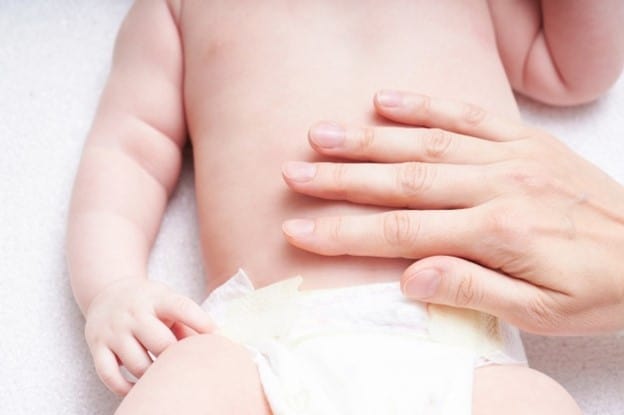
Antigas drops
Antigas drops contain simethicone, an ingredient known to break air bubbles. Little Remedies antigas drops have almost immediate results and are a favorite among many parents.
You can add gas relief drops to breastfeed milk or formula or give them directly. In both cases, they are very effective.
Antigas drops might be more effective than gripe water, but again, ask your pediatrician for a recommendation.
Chamomile tea
If you are breastfeeding, try drinking chamomile tea before breastfeeding. You can also ask your pediatrician about giving a few drops of chamomile tea to the baby after feeding.
Swaddling away
Tuck the baby into the blanket, dance and move around with the baby in your hands as much as possible. The movements might help improve the digestion process. However, wait a few minutes after feeding to prevent vomiting.

Bicycling the legs
Bicycling the baby’s legs can be an excellent way to relieve the gas, and tummy discomfort. Be gentle, and don’t forget to have songs to sing to baby along to entertain the baby during the exercise!
FAQs
Let’s see what you might wonder related to gripe water!
Do pediatricians recommend gripe water?
There isn’t scientific evidence that herbal remedies are beneficial. Some pediatricians recommend gripe water or gas drops as a simple and safe solution to digestion issues.
Can we give gripe water daily?
Four doses of gripe water are recommended for daily administering, as long as your pediatrician approves it.
Does gripe water help baby poop?
There isn’t evidence that gripe water helps the baby poop. Oppositely, one of the rare common side effects of gripe water is constipation.
Does gripe water need to be refrigerated?
You don’t need to keep gripe water in the refrigerator because there aren’t spoilage-free ingredients. Therefore, you can safely pack it in your diaper bag and carry it with you.
Does gripe water make babies sleepy?
Because it can relieve discomfort in babies, gripe water might help babies sleep more calmly, but it doesn’t make them sleepy.
Does gripe water help reflux?
There isn’t scientific evidence proving the positive effects of gripe water on reflux symptoms. Too much gripe water can worsen it.
Conclusion
Gripe water isn’t quackery, it is a herbal remedy whose effectiveness depends on the ingredients. It can be suitable for relieving colic symptoms, gas pain, and other digestion problems. Some may find it useless.
There are no two babies the same, so consult your pediatrician before you try it. Also, inspect the ingredient list to make sure gripe water is free of potentially harmful ingredients.
Good luck!
Have you tried gripe water? If you have, please share your experience and brand recommendations!
Don’t forget to share and like the article if you’ve found it useful!
—
